

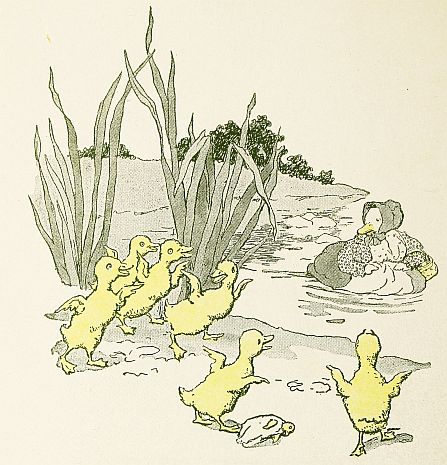

Written and Illustrated
by
New York
Dodd, Mead & Company
1915
Copyright, 1915
By Dodd, Mead & Company
OLD MOTHER DUCK and her six little ducklings lived in a hollow tree down by the river, and here they were all as happy as the day was long. They had the whole of the broad bright river to swim about on, and there was no one to bother them or drive them about.
Mother Duck had not always lived in the hollow tree. Once she had lived in a farmyard back in the country and away from the river. But she had not been very happy there. For one thing, there was a very cross old watch-dog in the farmyard. He was kept chained to his dog-house through the day, and never set loose until the other animals had gone to bed, but he used to snap at the ducks and chickens whenever they came near his dog-house, and that frightened them.
Then there was no place to swim but in a muddy little duck-pond that almost dried up in the heat of summer.
But the worst thing of all at the farmhouse was the way the farmer’s wife used to steal the duck’s eggs. No matter how carefully Mrs. Duck hid her eggs, Mrs. Farmer always found them and took them away. Once she put a number of them in a hen’s nest, and allowed a hen to set on them. After a while the hen hatched out eleven of the cunningest, fuzziest, yellowest ducklings that ever were seen. The hen was just as pleased and proud as though she had laid the eggs herself. But she didn’t in the least know how to bring up a brood of ducklings. Mrs. Duck could see that very plainly. She didn’t even want them to get their feet wet and she almost had a fit when they went into the water one day.
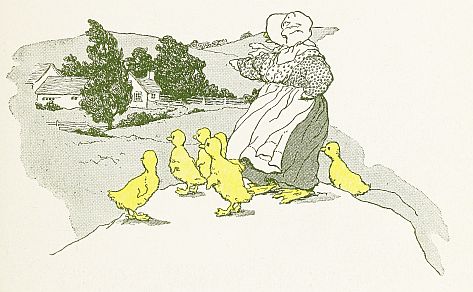
After that Mrs. Duck made up her mind she
would not stay at the farm any longer. She[3]
[4]
[5]
started off into the wide world early one morning
without saying anything to any one, and
waddled on and on and on until after a while
she came to the hollow tree beside the river.
Here she made a nest and hatched out a little brood for herself, and brought them up the way young ducklings should be brought up, and was very happy.
THERE were six of the little ducklings, and their names, beginning with the eldest were, Squdge and Queek, Buff, Pin-Toes and Fluffy, and the littlest and cunningest one of all was named Curly Tail.
Buff and Fluffy and Curly-Tail were girls, and the other three were boys.
One fine day when the wind was blowing, and the leaves were rustling, and the little wood-rabbits jumping high and kicking their heels for joy, Mother Duck told the little ducklings she was going to take them for a picnic.
“Oh, goody! goody!” they cried, and clapped their wings for joy.
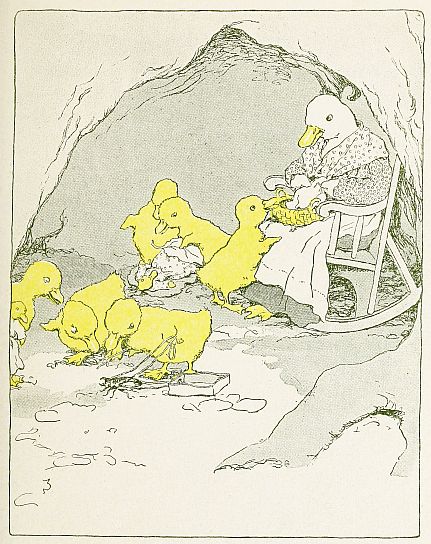
Mother Duck got out a little basket of meadow
grass that an old muskrat had made for her, and
she and the children packed it full of luncheon.
There were crisp watercress, and wild celery, and[7]
[8]
[9]
little snails, and all sorts of good things such as
little ducklings like to eat.
As soon as the basket was packed they started off.
The ducklings thought they would probably go down to the river, but instead of that Mother Duck led the way off into the wood, directly away from the water.
“Where are we going, mother? Where are we going?” asked the little ducklings. But the mother only smiled and shook her head and would not tell them.
After a while they came out of the wood and into a meadow-land where there was a heap of high rocks.
“Here’s where we’ll have our picnic,” said Mother Duck.
She put down the basket, and unpacked the food, and then she and the ducklings sat down around it, and ate and ate. And how good it all tasted! Just as food always does on picnics.
After they had all finished, and could eat no more, Mother Duck said, “Come now; let us climb up to the top of the rocks and see what we can see.”
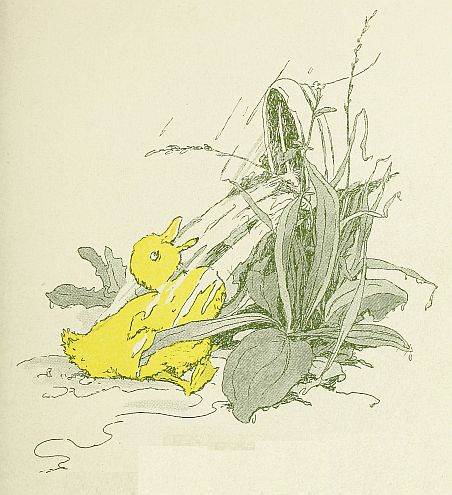
That was fun, too—clambering up over the rocks. The ducklings scrambled and slipped and queeked, and their mother helped them; so after a while they found themselves on the very tip top of the highest rock of all, and oh, how the wind did blow up there.
“Now look!” said Mother Duck. “Do you see over there?” and she pointed with her wing to a farmyard in the distance. “That is where I used to live.”
“Why, mother,” cried the ducklings, “we thought you’d always lived down by the river in our tree!”
“No, indeed; I lived right there in that farmyard,”
answered their mother; and then she began
to tell them about it, and of her life there,
and of how if she had stayed there they might[11]
[12]
[13]
have had a hen for their mother instead of her.
That seemed a horrible thing to the little ducklings—that
they might have had some other
mother instead of their own. They wanted to
know what a hen was, because of course they had
never seen one, living where they did. Their
mother tried to tell them, but they could not understand
very well.
“I wouldn’t like a hen for a mother,” cried Squdge; “but I would like to see a farmyard, and to hear a dog bark, and a cow moo. Do they make as big a noise as thunder? Will you take me there some time, mother?”
But Mother Duck told him, no indeed. It would be very dangerous to go back to the farmyard. If the farmer and his wife saw the ducklings they might catch them and shut them up in a coop, and never let them get away again.
The thought of that frightened the other ducklings—only Squdge said stoutly, “She couldn’t catch me! I can peck too hard and run too fast,[14] and I wish you would take me there some time, mother, just to see it all.”
Mother Duck made no answer, for looking up she saw that rain-clouds were gathering over head.
“Hurry, children, hurry,” she cried. “There’s going to be a storm, and we must get home before it begins.”
Down they scrambled in a great hurry, and started off through the woods as fast as they could, and they made such good time that they reached the hollow tree just as the first great drops began to fall.
They were all out of breath and rather tired, especially Curly-Tail, but as their mother said, that did not really matter as long as they had escaped a wetting.
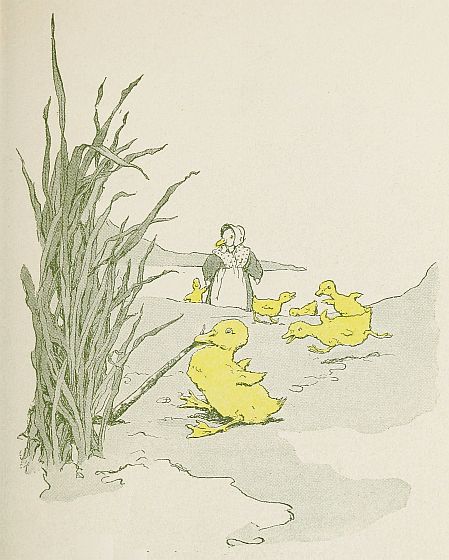
HOW cosy it was there in the dry hollow of the tree, with the rain beating harder and harder outside and streaming down the tree trunks.
After a while the ducklings got out their play-things and began to play with them, but soon they tired of this, and nestling down about their mother they begged her to tell them a story.
“A story?” said Mother Duck. “Very well. What shall it be about?”
“Tell about Wiggle-Waggle-Wisk-Tail!” cried Squdge and Queek.
“No, no; don’t tell about that,” begged Curly-Tail, almost in tears. “That’s too sad a story, mother. It always makes me cry.”
“Pshaw! I wouldn’t be such a baby as to cry over a story,” cried Squdge. “Go ahead, mother! Tell it, won’t you?”
The other four little ducklings wanted to hear it, too, so Mother Duck told Curly-Tail if she didn’t want to listen she could run over in the corner and play by herself for awhile, and when that story was finished she could come back and choose another one—any one that she liked, and her mother would tell it next.
So Curly-Tail, who was always sweet and obedient, went over in the corner and got out her doll, and began to play, while Mother Duck told the others the story.
And this is the sad tale of Wiggle-Waggle-Wisk-Tail.
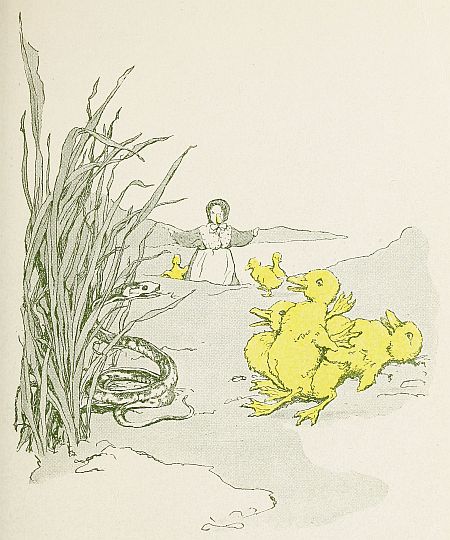
“WIGGLE-WAGGLE-WISK-TAIL was a very naughty little duckling. He quarrelled with his brothers and sisters, and he always wanted the best of everything for himself, and, worst of all, he was often disobedient to his dear good mother. Sometimes his mother hardly knew what to do, it worried her so to have him so naughty.
“Over and over again Wiggle-Waggle’s mother had told him that he must never go out of doors when it was raining. (You know I have often told you that myself, my dears,” said Mother Duck. “It is very, very bad for little ducks to go out in the rain. Flat water, like ponds and puddles and rivers, is good for them, but when water comes down from overhead like[22] rain, or water-falls, it is very bad for them. Sometimes they get drowned in it.)
“One day it began to rain and rain and rain around Wiggle-Waggle-Wisk-Tail’s house.
“His mother was very busy that day. She did not have time to watch over the children, but she never thought any of them would be foolish enough to go out in the rain. She had told them too often about the danger of it.
“But Wiggle-Waggle-Wisk-Tail would not believe anything that any one told him. He waited until his brothers and sisters were busy over their play, and then he slipped away very quietly, and out into the rain.
“Oh, how good it felt. He raised his bill and caught greedily at the drops as they fell.
“‘It’s wet’, said Wiggle-Waggle-Wisk-Tail to himself, ‘but it isn’t wet enough.’
“Just around the corner a rain-pipe came down from the roof of the farmhouse. The rain roared down it and spouted out like a waterfall.
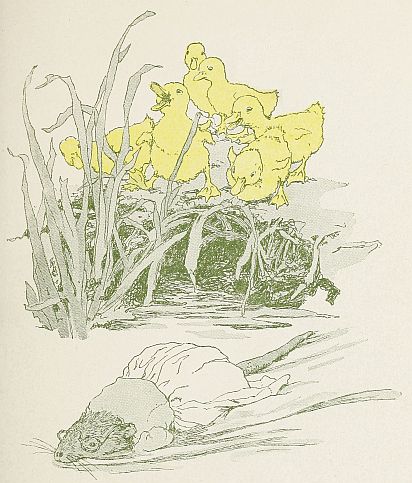
“‘Whew! This is the wettest thing I ever saw!’ cried Wiggle-Waggle. ‘I guess this is the place for me!’
“So he got right under the rain pipe where the water spouted hardest. It felt good on his back, and he held up his head, and opened his beak, and swallowed the water as fast as he could. Then he was wet inside as well as out—wet enough at last.
“‘If only mother could see me now,’ he giggled to himself.
“So he swallowed, and swallowed, and SWALLOWED until after awhile he was so full of water that he burst, just like a balloon that has been blown too full of air; and that was the end of him.
“Not till the rain was over did his mother find he was not at home. Then she came out to look for him, but she could not find him. She called and called him but he did not answer and he did not come. He never came home.
“Then his mother wept for him, and his brothers and sisters wept for him, but they never saw Wiggle-Waggle-Wisk-Tail again, because he was lying under the rain pipe all burst.”
That was the sad story of Wiggle-Waggle-Wisk-Tail that always made Curly-Tail cry. Not until it was ended would she come out of the corner, but when she did come and it was her turn to choose a story she chose a very different sort of one for her mother to tell—for she chose a funny story that made all the little ducklings laugh and laugh.
But the mother liked to tell them about Wiggle-Waggle-Wisk-Tail every now and then. She thought the story was a good lesson for them.
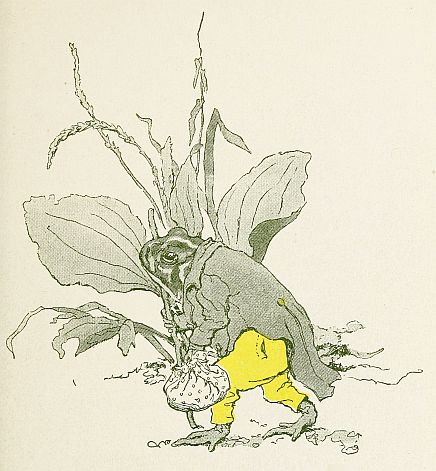
THE rain rained itself out in the night, and the next morning, when the little ducklings awoke, they found, to their glee, that the sun was shining bright and clear. That meant they could go down to the river for a swim as usual.
Very soon after breakfast the whole family started for the river. The ducklings ran ahead, while Mother Duck waddled after them. Only Curly-Tail stayed by her mother’s side, walking beside her, and holding to a fold of her skirt. She always liked to be close to mother.
“Don’t go in the water until I get there, children,” Mother Duck called after the others as they ran ahead.
“No, mother, we won’t,” answered the ducklings.
Squdge was a large, stout, active duckling. He could run faster than any of the others, and so he was the first to reach the river bank. There he began looking about for any tid-bits he could find in the way of a fat beetle, a grass-hopper or a tadpole. He was a very greedy duckling. Often and often his mother was obliged to tell him not to be so greedy, but to share things with his little brothers and sisters, but he was not always willing to do this.
Now as he peered about with his bright black eyes he suddenly espied near the mud-bank a little round hole, and just showing over the edge of the hole was what looked like the tail of a particularly fine, fat worm.
“Oh, ho!” thought Squdge to himself. “Here’s a fine fat morsel. I’ll just pull it out and eat it before any of the others come to share it with me.”
With his broad little beak he made a dive at the tail, and pinching it tight he began to pull.
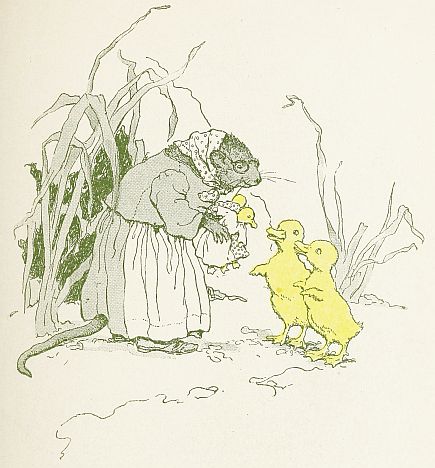
Now the tail did not belong to a worm at all, but to a little brown snake that had been lying there in the hole (which was its home) fast asleep.
When it felt some unseen thing nipping its tail and holding it, it was terribly frightened. It began to pull and struggle, trying to get loose, and Squdge kept pulling and trying to get it out. It must be a wonderfully fine fat worm to pull so hard, he thought, and the more it pulled the more determined he was to have it.
Before he could get it out, however, Queek and the others saw him, and up they ran, eager for a share of anything he might have caught.
They, too, seized hold of the tail and began to pull. All of them together were too strong for the snake. It had to come. Out they dragged it, out and out, longer and longer. Last of all its head slipped out from the hole. Then it twisted around, hissing with fright.
When the ducklings saw what they had caught—that[34] it was not a worm but a SNAKE—they were so terrified that they fell over backward on the ground and lay there, afraid to move. They dared not even look to see whether the snake had gone or was making ready to swallow them. If they had only known it, it had been just as much frightened as they, and as soon as it was free it had slipped away into the water to nurse its pinched tail in quiet.
They were still lying there when their mother and Curly-Tail reached the place. At first Mother Duck did not know what had happened to them; she was afraid they were hurt or sick. But when she had helped them to their feet, and found they were only frightened and not hurt at all she began to laugh at them.
“But now you see, children,” she said more
seriously, “what comes of being greedy. If you
hadn’t been in such a hurry to catch the worm
and gobble it down you would have waited till
I came, and I could soon have told you it[35]
[36]
[37]
was not a worm you had found, but a snake.”
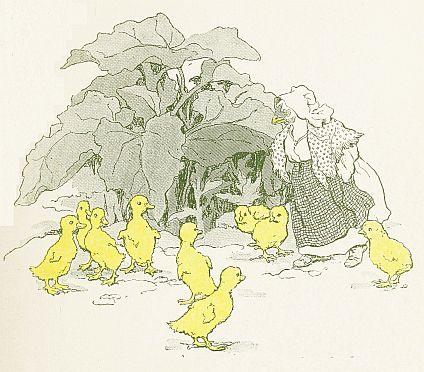
The little ducks felt quite ashamed of themselves. They felt they had acted in a very silly and greedy manner. Moreover, they felt quite sad, for their mother said they were so hot and frightened she could not allow them to go into the water just yet. They would have to sit on the bank for a while and cool off.
Then she took Curly-Tail down to a shallow place in the river and caught a nice little tadpole for her, while her brothers and sisters had to sit in a row along the bank and look on.
It was not very long, however, before their mother called to them that they could come, and the little ducklings ran joyously down the slope and slipped off into the water. There they paddled up and down, and stood on their heads, and ran water races with each other as merrily as ever, their adventure with the snake quite forgotten.
WHEN the ducklings stayed at home instead of going to the river (that was when it was too cold and stormy for them to swim) they had a number of toys to play with. Squdge and Queek had a little cart, and they had a tame beetle that they had trained to pull it. Sometimes they gave the dolls a ride in the cart. There were two dolls; one belonged to Fluffy, and one belonged to Curly-Tail. Mrs. Muskrat had made the dolls for them;—the same old muskrat who had made the picnic basket for their mother. The dolls were made of two old gnarled pieces of root that Mrs. Muskrat had gnawed and shaped with her sharp teeth until they looked just like two little wooden ducklings.
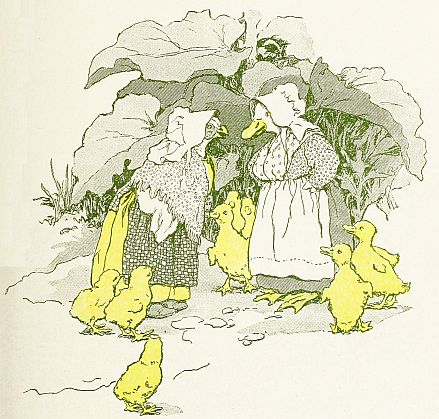
Fluffy and Curly-Tail loved these two little[39]
[40]
[41]
duckling dolls better than anything they had;
they dressed and undressed them, and took them
to bed with them at night, and sometimes even
took them down to the river with them.
The other ducklings often wished they had dolls, too, but Mrs. Muskrat had only made the two, one for Fluffy, and one for Curly-Tail. The way she had happened to make the dolls for them and not for the others was this:
One day the duck family had gone down to the river for their usual swim, and afterward Mother Duck felt very sleepy. She sat down on the bank in the warm sun, and all the little ducklings sat around her, and blinked and blinked, and after a while they all went to sleep. The ducklings were the first to waken. They opened their eyes and stirred about, and presently they said, “Mother, may we go up the river bank a little way?” For they were tired of staying in one place.
Mother Duck was too sleepy to do more than[42] open her eyes a tiny crack. “Yes; only don’t go too far, and don’t go in the water.”
The little ducks promised they wouldn’t, and then they ran merrily away together.
Soon they came to a place where the bank was quite high and overhung the water. Here they began to amuse themselves by pushing bits of mud and pebbles over into the water to make a splash.
Presently they heard something stirring and rustling down there beneath. They stopped and listened and looked. Squdge and Pin-Toes even crept to the edge of the bank and leaned far over trying to see what was there. Fluffy was afraid if they did not take care they might fall into the river.
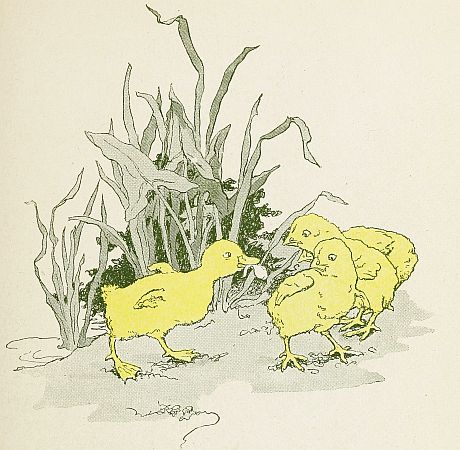
Suddenly out from under the bank swam old
Mrs. Muskrat. Her house was just exactly under
where the ducklings were standing, though
they had not known it. She had been busy finishing
her housework and now she was starting[43]
[44]
[45]
out on some errand she had down the river. She
always swam when she wanted to go anywhere.
She could go more quickly and safely that way
than by land. She had on a calico dress and a
white apron, and a pair of big spectacles were
on her nose. (All her clothes were waterproof,
and shed off the water just the way a duck’s
feathers do.) She looked so funny with her nose
almost under water and her dress bunching up,
and her tail dragging behind her, that some of
the ducklings began to laugh.
“Oh don’t laugh,” begged Fluffy, who was a very polite little duckling. “She might hear you.”
“No she won’t; she can’t hear us down there,” said Queek.
“I don’t care whether she does or not,” cried Squdge, “she’s so funny looking.” And he laughed till he almost fell over.
Then all the other ducklings began to laugh, too;—all except Fluffy and Curly-Tail. Fluffy[46] and Curly-Tail did not laugh. They were troubled to think their brothers and sister could behave so rudely, and to an older animal. To be sure Mrs. Muskrat never looked round to see who they were, and that was some comfort.
Now as it happened the old muskrat did not have to look round in order to see them, though the ducklings did not know that. When the light shone on her spectacles it made them just like looking-glasses, and she could see in them what was happening behind her. She saw, in her spectacles, that Squdge was laughing and pointing at her. She saw the others laughing, too, all except Fluffy and Curly-Tail, and she saw that those two did not laugh, but looked worried and sorry. She saw all this, but she did not take any notice of it. She just swam quietly on down the river and out of sight.
But two or three days afterward an old toad knocked at the hollow tree and said he had a message for Mrs. Duck.
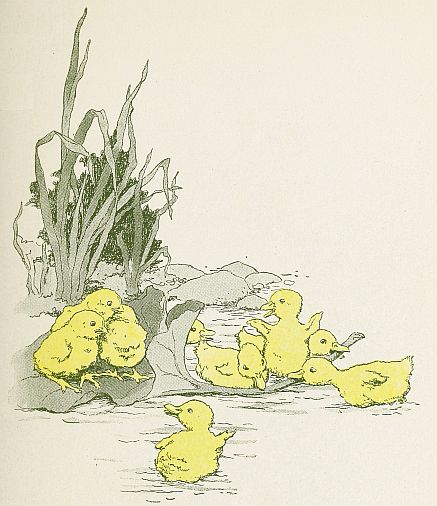
This toad had been living down by the river for some time, but it was so damp there that it had given him rheumatism, so he had determined to come up and live in the wood where it was dryer.
Mrs. Muskrat had heard of this, and so she asked him, as he would be going past the hollow tree to leave a message there for her.
This was the message. She wanted Mother Duck to send the two little ducklings who hadn’t laughed at her the other day down to see her. It was about something very important.
“That’s me and Curly-Tail, mother! We were the ones who didn’t laugh,” cried Fluffy. “But what do you s’pose she wants with us, mother?”
“I don’t know, but you had better go and see.”
The two little ducklings were not very anxious to do this. They felt very shy about going all alone down the river to make a visit.
“I’ll go,” said Squdge. “I don’t mind.”
“No indeed you won’t go,” said the mother. “You’ve been too naughty. Mrs. Muskrat doesn’t want to see any little duckling that has been as rude to her as you have been.” At last she told Fluffy and Curly-Tail that she herself would go part of the way with them.
She took them down within sight of the muskrat’s house, and then she sent them on alone.
Fluffy and Curly-Tail walked on very slowly, often stopping to look back at their mother as she stood there watching them.
“Will you knock when we get there, Curly-Tail?” asked Fluffy.
“No, you knock.”
“No, I don’t like to; you knock.”
But as it turned out neither of them had to knock at Mrs. Muskrat’s door, for when they reached her house she was on the lookout for them. She came out smiling, and looking quite friendly and pleasant in spite of her long rat teeth.
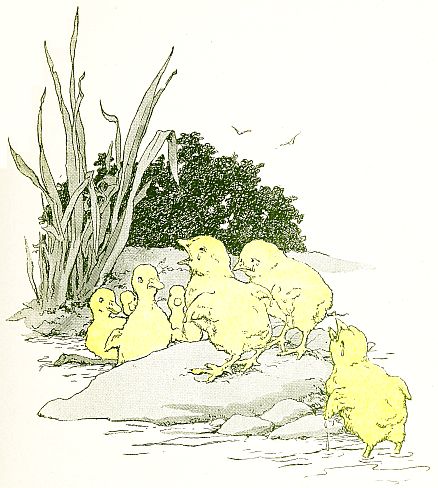
“So you are the two little ducklings who didn’t laugh at me the other day,” she said. “That’s right! That’s right! I like little animals when they are polite and respectful. Now I have a present for you that I think you’ll like.”
She went back into the house, and when she came out again she carried the two little duckling dolls. “Here; these are for you,” she said, and she gave one to Fluffy and one to Curly-Tail.
The little ducklings could hardly believe their eyes. They had never seen anything so cunning and pretty before. “But they’re not for us?” they cried. “Not really?”
“Yes they are,” said Mrs. Muskrat, smiling, and looking almost as pleased as they.
The two little ducklings hardly knew how to thank her enough. Then they were eager to show the dolls to their mother. They said good-bye to the muskrat, and ran back to where Mother Duck was waiting for them, “Look, mother! Look! Look!” they cried.
Mrs. Duck took the dolls and examined them.
“Why, yes, they are very beautiful,” she said. “Wasn’t Mrs. Muskrat good to give you such wonderful presents. You must be very careful not to break them.”
“Oh, yes, we will! We will!” cried the happy little ducklings.
When they got back to the tree, and the others saw the beautiful presents Mrs. Muskrat had given them they wished they hadn’t laughed at her either; then perhaps she would have given them dolls too. But it was too late for wishing that now.
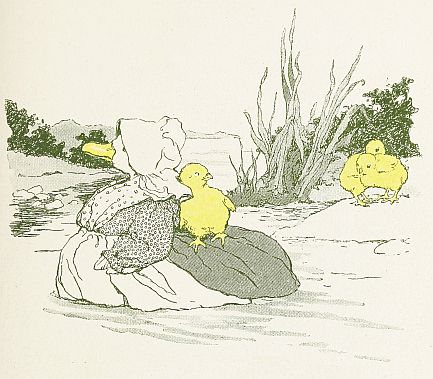
“I’LL race you down to the big burdock, Queek,” said Squdge one day, as he and the others started out for the river with Mother Duck.
“All right.”
“Let’s all race,” cried Buff, who could run almost as fast as her brothers.
“Very well,” said Queek; “only we’ll have to give Fluffy and Curly-Tail a start, because they can’t run as fast as we can.”
So Fluffy and Curly-Tail went some distance down the path, and then Squdge shouted “Go!” and away they all raced.
“Wait for me at the burdocks!” their mother called after them. “Don’t go down to the river without me.” But the ducklings were racing too hard to stop to answer her.
The little ducks all reached the burdocks at about the same time, though Squdge was a little ahead. They were so out of breath that they were glad to drop down in the shadow to get cooled off while they waited for their mother.
Suddenly, as they sat there, they heard, back of the burdocks, a curious scratching and rustling, and a something that sounded like “Cluck! cluck! cluck!”
“What’s that, Squdge?” whispered Queek.
“I don’t know what it is.”
“I’m scared,” said Buff, “it sounds so queer. Let’s run back and find mother.”
The ducklings jumped up, but before they could run away, around from the other side of the burdock came a great grey, feathery creature, with hard, bright eyes and a sharp beak. She was followed by a brood of little, downy, yellow young ones that seemed to be her children. As soon as the young ones saw the ducklings they stopped and stared at them wonderingly.
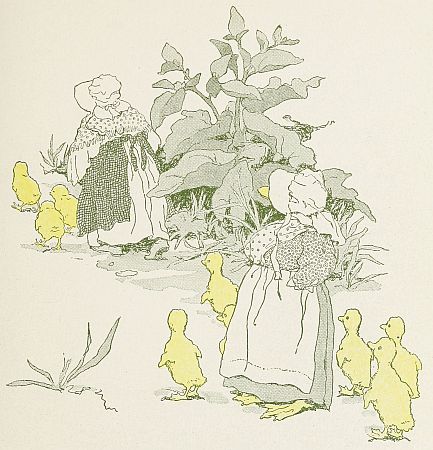
“Cluck! cluck!” cried the mother. “What have we here? Ducklings I do believe.” Then as Squdge seemed about to come toward her she ruffled her feathers angrily. “Don’t you come any nearer,” she cried, “if you do I’ll peck you. I don’t allow any strange animals to come near my children.”
The ducklings were quite frightened at her angry looks. They were about to turn and run away, when to their joy they saw their mother coming around a bend in the path.
As soon as Mother Duck saw a stranger talking to her children she hurried forward. Then when she came a little nearer she gave a quack of pleasure.
“Why, Mrs. Henny Penny!” she cried. “Is that you? Wherever did you come from?”
“Well I declare if it isn’t Mrs. Duck!” replied the hen. “I brought the children out for a walk, and we’ve come further than we expected. I’m sure I never thought I’d find you here.”
The two fowls were so pleased to see each other that they both began talking at once, asking questions, and givings answers, while the little ones listened wonderingly.
“I suppose you’re still living at the farm,” said the duck. “And these are your little ones, are they? What fine chicks they are.”
“You have some fine children, yourself,” answered the hen, much pleased. “How exactly they look like you.”
“They’re very good children, on the whole,” said the duck, “only sometimes they’re rather naughty, and I have to scold them a little. But how are all the things at the farmyard? The geese and the turkeys and the guinea-fowls? And old Mr. Tige? Is he alive still? My, my! What a cross dog he was.”
The hen said yes, he was. “He’s alive still, and
crosser than ever. Why the other day old Mrs.
Speckeldy Hen just happened to go too near his
dog house, and he jumped right out at her and[63]
[64]
[65]
pulled out a whole mouthful of tail feathers!”
“My!” cried the duck. “Wasn’t that awful? What did Mr. Rooster say?”
“Why he said—”
Just then the duck noticed that all the little ones were standing about and listening with open beaks.
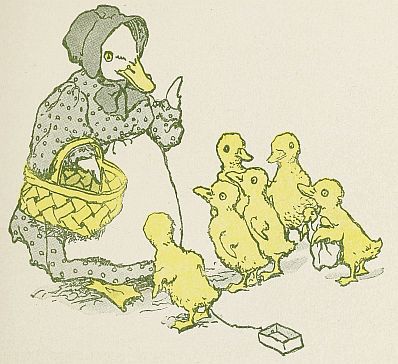
“Now, children, don’t stand there listening,” she cried. “You know I don’t like you to listen when older creatures are talking. Run on down to the river, and take these nice little chicks along with you—only don’t go in till I come. Perhaps you might catch them a tadpole or so.”
“Yes, run along,” said the hen. “We’ll be along in a minute. Be sure you don’t get your feet wet, children.”
That seemed to the ducklings a funny thing for any one to say—“Don’t get your feet wet,”—but they and the chicks started off together, and ran on gaily down the path toward the river, while the older fowls followed more slowly.
As soon as the little ones reached the river Squdge, who had taken a great fancy to a little chicken named Bright-Eyes, ran down to a shallow where the tadpoles lived, and caught a nice fat one, and brought it to her in his beak. Instead of taking it, however, Bright Eyes looked quite disgusted.
“Ugh!” she cried. “Take it way. The nasty thing!”
“Nasty!” cried Squdge with surprise. “Why it’s good. Haven’t you ever eaten a tadpole before?”
“No, and I don’t want to eat one now, either.”
All the other chickens said the same, so Squdge ate the tadpole himself, and very good it tasted to him, too.
“I’ll tell you what,” said Queek; “I don’t believe mother would mind if we went in here where the water is shallow, and had a swim. It’s deep enough if we hold up our legs.”
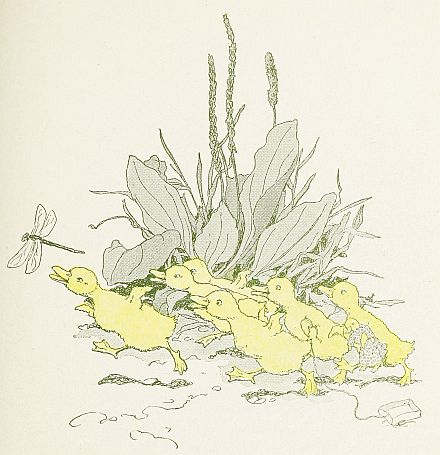
“But we don’t know how to swim,” cried the chickens.
Not know how to swim! The ducklings could hardly believe it. “Why, what do you do when you go in the water?” they asked.
“We don’t go in the water!”
The ducklings stared at them with pity and surprise. They had never heard of such a thing as not going in the water. Then Squdge had a bright idea. “I know!” he cried; “let’s give the chicks a ride on the river. We’ll get a big leaf and have it for a boat, and then the chicks can get on it, and we’ll pull it.”
The chicks did not like the idea very much. They were afraid. But the ducklings were so eager about it that they hardly knew how to say no.
Squdge found a big leaf and he and the others nipped it off with their sharp beaks, and pulled it down into the river. “Now get on it,” they shouted joyously.
“But we’re afraid,” whimpered the chicks.
“Oh, come on! it won’t hurt you. You’ll just love it, it’s such fun.”
Timidly the chicks stepped onto the leaf, and huddled together in the middle of it while the ducklings pulled it out into the stream.
“Faster, faster,” cried Squdge, holding the stem with his beak, and swimming as hard as he could. “Here! Take it around this rock.”
The water washed over the leaf, and the chickens shrieked with fear. A moment later the boat caught on a ledge and at once tilted over so that the chickens were upset into the water.
“Oh! oh!” cried Buff. “Look what we’ve done.”
The ducklings hurried to the help of the chicks, and pushing and pulling they managed to get them up on the rock where they were safe.
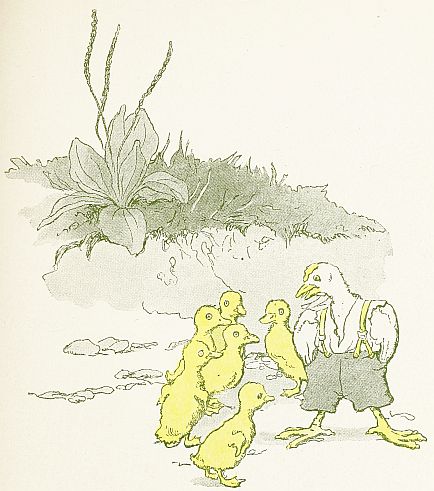
The chickens were dripping wet however and
so frightened they hardly knew where they were.
“Oh! oh!” they wept. “We’ll be drowned! We[71]
[72]
[73]
want to go home. Oh! Boo-hoo! Boo-hoo!”
The ducklings stood looking on in dismay, not knowing what to do or say.
At this moment a shriek sounded from the bank. “Oh, my chicks! my chicks!”
The duck and the hen had reached the river side, and the hen had seen her chickens far out on a rock, wet and shivering with fear. “Oh what shall I do! What shall I do,” she shrieked. “They can never get back.”
“Yes they can, too; now don’t you be so worried,” said the duck. “I’ll bring them back.”
“But you can’t; I know you can’t. How can you?”
“Why, easily enough. I’ll swim out to them, and they can sit on my back, and I’ll carry them back.”
“But you’ll spill them off. I’m sure you will.”
“No I won’t either. I’ll bring one at a time. Now just you watch.”
The duck slipped off into the water, and soon[74] reached the rock where the chicks were standing. At first she had a great deal of trouble in getting any one of them to climb up on her back. They were afraid of slipping off into the water; but presently Bright-Eyes ventured to scramble up and snuggle down against Mother Duck’s neck. As soon as she was settled there the old duck sailed out on the water and carried the little chick safely over to her mother.
When the other two chicks saw that Bright-Eyes was safe on shore they were eager to clamber upon the duck’s back and have her carry them over, too.
Oh, how thankful the hen was when she had her chicks back on dry land again. She felt so happy and thankful that she hardly knew what to say to the duck.
“If it hadn’t been for you they would all have been drowned,” she cried.
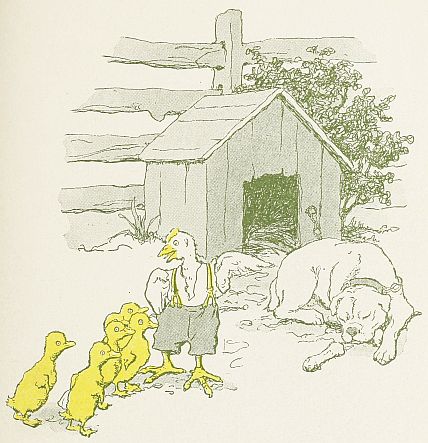
“Yes, but if it hadn’t been for my children they[75]
[76]
[77]
wouldn’t have been out there at all,” replied the
duck.
She wanted the hen to bring the chickens up to the hollow tree to rest and get dry, but this the hen would not do. There was nothing she wished so much now as to get her chicks safe home again. She made up her mind that never, never would she venture away from the farmyard again—at least until the chicks were old enough and big enough to take care of themselves.
So the two fowls said good-bye to each other and parted, and then Mother Duck took her children home again without allowing them to go in for another swim. They had indeed been very naughty and disobedient little ducklings, and Mother Duck told them that for a punishment they would not be allowed to go down to the river again for three whole days.
That was indeed a sad thing for the little ducks. They almost cried over it. But then it[78] might have been worse. She might have told them they couldn’t go back again for a week. They had been naughty enough almost to deserve even that.
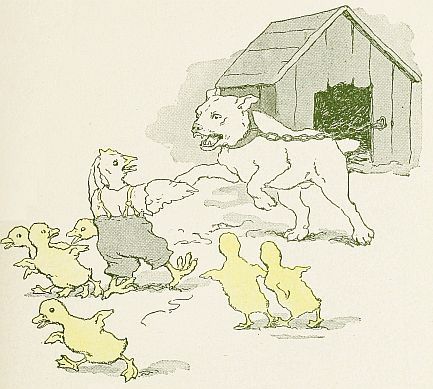
ONE day Mother Duck got up bright and early, and put on her bonnet and her shawl, and took a market basket on her wing.
“Now, children, I’m going to market,” she said. “Don’t go out of sight of home while I’m away, and don’t go down to the river, and don’t talk with any stranger animals.”
And all the little ducklings answered, “No, mother.”
Then the old duck put on her bonnet and her shawl, and took her basket on her arm and started off.
For awhile after she had gone the little ducks played about close to the hollow tree, and then they wandered a little further off, and then they began to see how far they could go without losing sight of home.
“I wish mother would hurry back,” said Squdge at last, “I’m getting hungry. Wouldn’t a tadpole or some watercress taste good now!”
“Indeed it would,” said Queek. “Or even a beetle if we could find one.”
Just as Queek said that a bright long-tailed fly flew close by over Buff’s head. “Catch it, catch it, Buff!” cried Queek.
Buff made a jump and missed it, though his beak just grazed its tail.
“Catch it!” cried Squdge, starting after it with leaps and bounds; and—“Catch it! catch it!” cried the others, running after him as fast as they could. Their mother’s words were all forgotten.
On and on they went, leaping and snatching, and sometimes falling over each other in their hurry. At last their chase led them out into a road, and then the fly rose straight up over their heads, up and up until it was lost to sight in the sunlit air. The ducklings stood gaping after it hungrily.
“Hey there, you young ’uns! What do you think you’re doing?” asked a rough voice.
The ducklings started.
Before them, in the road, stood a ragged, impudent-looking, half-grown chicken.
“What do you think you’re doing?” he asked again.
“Oh, if you please, sir, we were trying to catch a fly,” answered Queek rather timidly.
“A fly! What did you want to catch a fly for?”
“We thought we’d eat it.”
“Eat it! Eat a fly? Haven’t you any corn or bread or things of that kind at home?”
Queek shook his head. “We don’t know what corn is, or bread either.”
“Don’t know what they are! Why, at the farmyard where I live the farmer’s wife comes out twice a day and gives us all we can eat. Sometimes she gives us a dish of curds, too; or a meat bone to pick. Though mostly we have to[84] share our meat bones with the watch-dog. He’s a great friend of mine, old Mr. Tige is. He’d let me have his bones any time if I wanted them.”
“Mr. Tige!” cried Squdge. “Why, that’s the name of the watch-dog at the farm where our mother used to live. Where is your farmyard?”
“Oh, over there,” said the chicken, pointing with his wing. “Who is your mother, anyway?”
The ducklings told him who their mother was, and where they lived, and all about themselves.
They, in turn, asked him about the farmyard.
“I’m just sure that’s where our mother used to live,” said Buff. “Oh, how I wish we could see it.”
“Well, you can. Come along with me, and I’ll show it to you.”
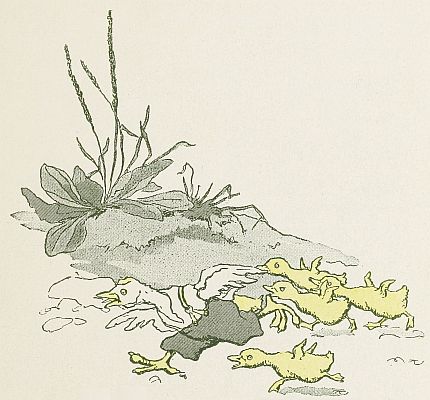
“All right,” cried Squdge and Queek.
The other four ducklings were afraid they
oughtn’t to go, but Squdge and Queek were so
eager to, and so unwilling to turn back, that after
a while the others, too, agreed to go on to the[85]
[86]
[87]
farmyard. The ragged chicken led the way, and
they all followed.
As they went the chicken’s talk was all about himself and the farmyard. He told them of how much the farmer’s wife thought of him, and about his friend the turkey-cock, and about old Tige.
“Why,” he cried, “I don’t know what Tige would do if anything was to happen to me. I guess he’d just break his chain and come out to look for me.”
The ducklings thought the chicken must be a very important person indeed for every one to be so fond of him.
After a while they came to a high board fence. The chicken slipped through a hole, and the ducklings followed him, and at once they were in the farmyard.
Once inside they looked about them wonderingly. Not far from them a hen was busily scratching for a brood of chickens. At first they thought it must be the hen they had met down by[88] the river, but then they saw that this was a larger, darker hen. A cock on the dung-hill crowed loud and clear, and the ducklings started. “What’s that?” asked Squdge in a frightened voice.
“That? Oh, that’s nothing. That’s just a rooster crowing. Didn’t you ever hear one before?”
Over in a sunny corner were four great moving, breathing things, lifted far, far up in the air on great thick legs. “And what are those?” asked Squdge, pointing at them.
“Cows. Didn’t you ever see cows before? Oh, my! You certainly don’t know much,” said the chicken scornfully.
The little ducklings looked at the cows with awe. Any one of those great feet, if it happened to tread on them would crush them as easily as though they were beetles or tadpoles.
“And where’s your friend, Mr. Tige?”
“Old Tige?” said the chicken, hesitatingly. “Well, you see he may be asleep. If he is I[89] wouldn’t like to waken him. He has to bark so much in the night that sometimes he’s very tired in the day-time.”
“But can’t we just see what he looks like?”
“Well—come on; maybe I can show you. He lives in that dog house over there.”
The chicken led the way toward the dog house, and the ducklings followed him. He walked on his tip-toes, and kept whispering to the ducklings not to make a noise. They might almost have thought that he was afraid of Tige if he hadn’t told them he wasn’t.
They reached the dog house and peeped around the corner of it. There, sure enough, lay old Tige in the sunshine, fast asleep. He was a big, fierce looking brindled dog. Now and then he twitched his ear or moved his paw in his dreams. It frightened the ducklings even to look at him.
When the chicken saw the dog was asleep he grew much bolder. “Yes, there he is, fast asleep, just like I told you,” he said. “Do you see that[90] bone there by his nose? If he was only awake I’d ask him to give it to you. He would do it I know, if I asked him.”
Just then the great dog woke and opened one eye a little, but the chicken did not notice that, he was so busy boasting to the ducklings.
Now the dog was not really a friend of the chicken at all. In fact he hated it. It was always creeping up and trying to steal his food. Again and again he had tried to catch it, but always it kept just out of reach. But now it had come so near, that it almost seemed as though, with one bound he could grab it. Very, very quietly he drew himself together, without the chicken’s noticing it, and then suddenly with a bound and a roar he was up and at the chicken. He would have caught it, too, if his chain had only been a little longer. As it was his teeth just grazed its feathers.
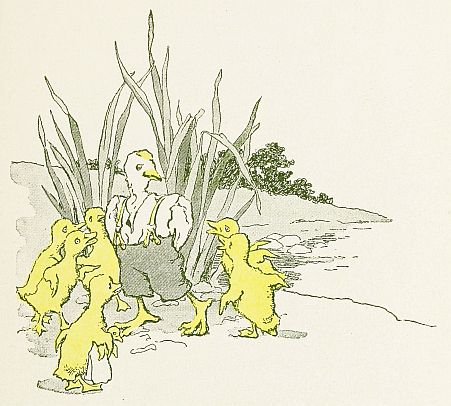
The chicken gave a wild squawk, and fled with
spread wings toward the hole in the fence. The[91]
[92]
[93]
ducklings tumbled after it, almost scared out of
their wits.
The chicken squeezed through the hole and rushed on down the road, and the little ducks, too, squeezed through the hole and ran after it.
On and on ran the chicken, and on and on ran the ducklings. For all they knew the dog might have broken his chain and be close at their heels.
After a while they came to the river and could go no further. But it was a part of the river that the ducklings had never seen before. Here the chicken turned on them angrily.
“Why don’t you go home?” he cried. “Why do you keep following me? I don’t want you. Go home I tell you.”
“But we don’t know how to get home,” cried the ducklings, and Curly-Tail began to cry.
“Well, I don’t care where you go, only don’t keep following me because I won’t have it. I’m tired of you.”
“We won’t; we won’t follow you if you’ll just tell us how to get home.”
“No, I won’t tell you. I’m going back to the farmyard. It must be feeding time now. And don’t you dare to come too. If you do I’ll peck you.”
The chicken was angry because the ducklings had seen him frightened, and because they had found out he was not a friend of the dog after all.
“Oh, what shall we do! We’re lost! We’re lost!” wept the ducklings.
But the chicken paid no attention to them. He gave them one scornful look, and then he stuck his wings in his pockets, and stalked away up the road, leaving them alone.
And now the poor little ducklings were very miserable indeed. They all wept bitter tears. Even Squdge began to cry. “Oh, if we could only get home,” they wept, “we’d never, never run away again, but always be good obedient little ducklings.”
Suddenly Queek, who had dried his eyes for a moment, looked up the river and gave a cry of joy.
“Look! Look!” he shouted.
The ducklings stared through their tears, and then they began to clap their wings and shout for joy. There, sailing quietly down the river, in her shawl and bonnet, her basket on her arm, came their own dear mother.
“Mother! Mother!” they shouted all together. “Here we are, mother! Come quick!”
The mother looked and stared and then came sailing over toward the bank. She could hardly believe her eyes.
“Why, children, whatever are you doing here?” she cried.
“Oh, we ran away from home, and we got lost, but if you’ll only take us back we’ll never be naughty disobedient little ducks again.”
They had indeed been very naughty to run away when their mother had told them not to, but[96] they looked so frightened and sorrowful that she had not the heart to scold them.
“Well, well! We won’t talk about it now,” she said. “Perhaps you’ve been punished enough as it is by being so frightened. Slip down into the river and I’ll take you home this way.”
So the ducklings slid down into the water and sailed away at their mother’s side, and it was not long before they came within sight of their own dear home-landing and the hollow tree beyond. Then what thankful and happy little ducklings they were!
“Mother,” said Squdge solemnly, “I’m never, never going to be naughty again. I’m always going to do exactly what you tell me to do.”
And all the other little ducklings said the same.
“Well, I’m glad to hear that,” said their mother. “What a happy family we will be if I never have to scold you any more.”
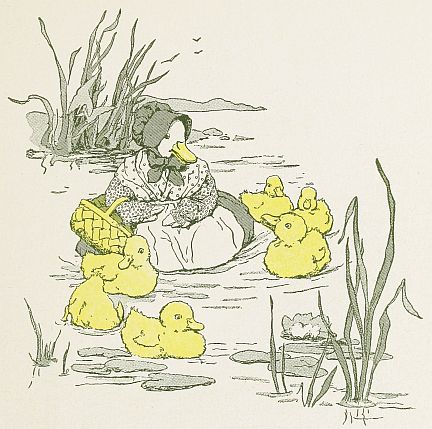
But of course the little ducklings were naughty[97]
[98]
[99]
sometimes, even after that; but they were good
enough for their mother to feel that on the whole
her little ducklings were the dearest, sweetest,
cunningest little ducklings in all the world—to
her at least.
THE END
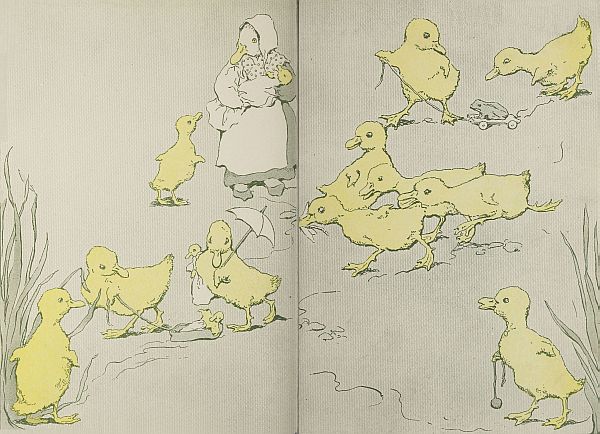
Obvious punctuation errors repaired.
Page 42, “were” changed to “where” (where the ducklings)